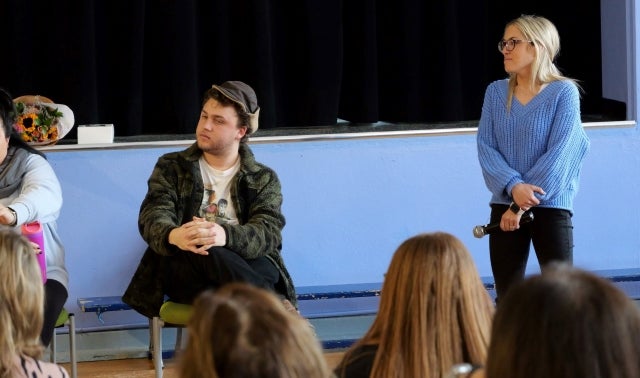Summit School marks six decades of educating the neurodiverse

by Paul Karwatsky
Sam Lewis is 24 years old. It’s his first time back at Summit School in Saint-Laurent in three years. He’s returned not as a student but as an alumnus.
“I love film. That’s me. That’s who I am.” Sam is addressing a large crowd at the school’s annual parent/caregiver panel. He’s poised and confident. He has autism. He is just one of Summit’s many success stories.
Sam came to Summit in Grade 4, after being bullied relentlessly at a traditional school. Now, as a Summit graduate, he’s been accepted into John Abbott College.
“The Summit Theatre Program gave me the opportunity to discover my inner talent, which I never thought I had,” he said.
For 60 years, Summit School has been at the forefront of interdisciplinary education for neurodiverse students. The school accepts students from five to 21 years of age. Its approach has been ground-breaking, offering students a safe and supportive environment to explore their passions and reach their full potential.
“Summit School has over 250 staff members all working together for the best interests of our students,” said senior principal Bena Finkelberg, who has been at the school for 35 years. “We like to frame it as an interdisciplinary team of professionals who all work under one roof to help our students reach their full potential. Our goal is for every student to leave Summit School being as independent as they can be. This can look very different for each student. Our population is so varied; hence our goals need to be individualized and multi-faceted.”
Herman Erdogmus has been Summit’s director general for the last 10 years. “Our focus has always been on creating opportunities for our students to succeed, no matter their background or abilities,” he said. “Over the course of the last 10 years, Summit has grown tremendously. The school’s main campus has expanded three times and is now accommodating 450 students, making it one of the largest schools for the neurodiverse in Canada. Now we’re ready for the next chapter.”
Besides the main campus, Summit also runs a high-school-aged campus for 150 students at the English Montreal School Board’s LaurenHill Academy in Saint-Laurent and a downtown “TECC” campus for 16 to 21-year-olds that focuses on job integration for the neurodiverse and internship partnerships with more than 40 Montreal companies and businesses.
In 2016, Summit launched SCERT, a unique research centre focusing on educational best practices for the neurodiverse embedded within a school. It is affiliated with McGill University’s Department of Educational and Counselling Psychology. Jake Burack is one of the renowned autism researchers helping to lead SCERT into the future. He said, “SCERT represents a unique and innovative school-based researcher-educator collaboration in which the researchers inform the educators about cutting-edge science and knowledge, while the educators inform the researchers about compelling educational issues and topics that need to be studied.”
Summit’s next step falls right in line with Sam’s passion. The school is in the midst of a capital campaign to build The Summit Centre for Creative Arts and Physical Education. The concept: a research-friendly centre that focuses on showcasing and professionalizing the legitimate artistic talents of those with neurological conditions.
Explained Jesse Heffring, director of Development and long-time arts teacher, “Summit has a long history in the arts. It manifests in stellar educational and therapeutic intervention rooted in creativity. But it has also put together serious theatre productions that have been presented on marquee stages like the Segal Centre.”
A documentary on one of those productions, Being Rachel, won best documentary at the Belfast Human Rights Film Festival.
And as for Sam, this isn’t the first or last time he’ll be taking centre stage.
“Summit gave me a platform to express myself through my talent. It motivated me to not only pursue theatre, but I also found the will to try out different things out in the world.”
That level of confidence is the key takeaway for Summit after 60 years. Students depart, ready to face the world, not uncertain about their differences, but certain that those differences shouldn’t get in the way of making the world their own.
Paul Karwatsky is communications director at Summit School.









